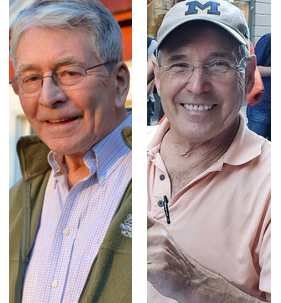Gift from Daniel E. Offutt III Charitable Trust endows CSE chair and funds targeted activities
The gift will be extremely valuable as CSE continues to progress as a computer science powerhouse.

 Enlarge
Enlarge
A gift of $2.5M from the Daniel E. Offutt III Charitable Trust has been made to endow the Computer Science and Engineering Division Chair. CSE, one of two divisions in the Electrical Engineering and Computer Science Department, is one of the largest units in the College of Engineering. The gift provides discretionary support to the chair and also includes provisions that will help to fund the activities of two additional individuals.
The late Mr. Offutt graduated from the University of Maryland and received an MBA from Columbia University in 1965. His career was as a stock trader. His longtime friend and colleague, Richard Orenstein, made the gift on behalf of the Trust.
Richard Orenstein (BS Math 1962) was a student at U-M from 1958–1962, a time period during which computing was still emerging as an area of research and as a discipline at the University. Some classes in computation were being developed and offered, but an undergraduate program would not be formed until 1965. Orenstein, who had a strong interest in the nascent field, took as many classes in computing as he could and majored in math. He continues to hold a strong interest in computing related research at Michigan.
After completion of his degree, Orenstein took a post at MIT, where he was a part of the team that developed and implemented the Compatible Time-Sharing System (CTSS) at the MIT Computation Center in 1963. CTSS was created to increase the efficiency of debugging and running large applications, and to make feasible new classes of applications. In 1967, along with others, he founded Computer Software Systems, later renamed National CSS, which was sold in 1979.
Alec D. Gallimore, the Robert J. Vlasic Dean of Engineering at Michigan, said that “Dick Orenstein’s generosity through the Offutt Trust will be extremely valuable as CSE continues to progress as a computer science powerhouse. This gift will help us in addressing the challenges that accompany a sustained increase in the number of declared undergraduate computer science majors, in continuing the work of building an inclusive and diverse community, and in attracting top faculty members and learners in computing and data science to Michigan. We are grateful for Dick’s support.”
In addition to funding the CSE Chair, the Orenstein Chair gift provides support for two individuals: David Chesney, a lecturer in CSE, and Damen Provost, Managing Director of the Robotics Institute.
Chesney has a long history of engaging his students in projects for the greater good. His ENG100 course introduces students to computer science and requires that their projects aim for social relevance. His upper level courses are centered around projects in which students build software systems that make use of new technology and address a disability or illness. This has included using the Microsoft Hololens as an augmented reality system for surgeons, and developing technical aids for those who are blind, and for children who are on the autism spectrum or are born with cerebral palsy. Through a relationship with Mott Children’s Hospital, many of these projects are put to therapeutic use. In the Spring/Summer of 2020, Chesney’s course has focused on COVID-19.
Provost, an engineer and program manager for NASA and U-M’s CYGNSS satellite constellation, champions new initiatives that actively define and differentiate the relatively new Robotics program at Michigan. This has included oversight of the outfitting of the $75M Ford Motor Company Robotics Building, which will open in Fall 2020. Provost has also helped secure grants to upgrade the outdoor autonomous system testing site, M-Air, with over 30 motion capture cameras and next-generation wireless communication. In addition, Provost has collaborated with corporate partners to launch the Robotics Fellowship Program, providing students an opportunity to combine a summer position in the industry with robotics research coursework.


 MENU
MENU